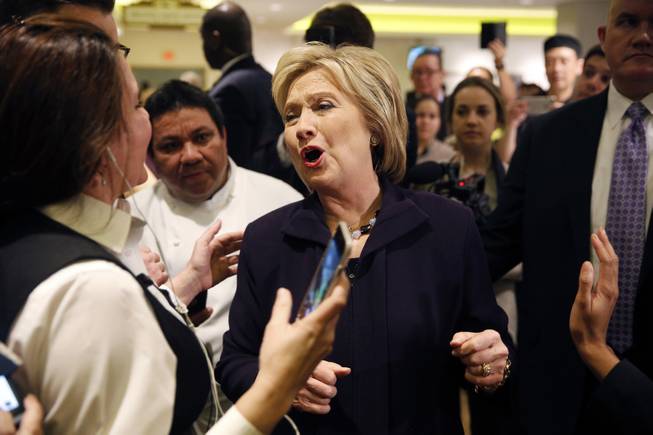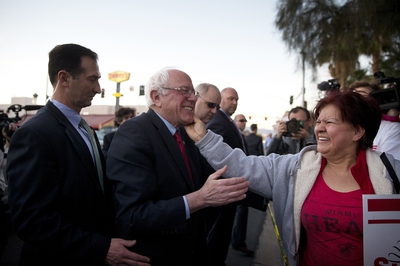
John Locher / AP
Democratic presidential candidate Hillary Clinton reacts while speaking with MGM Grand employees during a visit to the hotel and casino Thursday, Feb. 18, 2016, in Las Vegas.
Friday, Feb. 19, 2016 | 2 a.m.
When it comes to labor powerhouses in Nevada, few organizations quite match the Culinary Workers Union: 57,000 strong, more than 50 percent Latino, with an 80-year history of labor advocacy on the Strip and a record of turning out its members in political campaigns.
But to the increasing distress of the two Democratic presidential contenders, Sen. Bernie Sanders of Vermont and Hillary Clinton, the union has decided to sit out the Democratic presidential caucuses in Las Vegas on Saturday, setting off a free-for-all for its members and adding to the increasingly tense and unsettled political atmosphere here. Both campaigns have pressed union leaders to change their minds and step in at the last minute, though chances of that appear remote.
Union leaders said they were staying on the sidelines because the demands of mobilizing behind either Sanders or Clinton would divert resources, distract members and potentially polarize the union just as they are entering critical contract negotiations. The Culinary Workers will instead focus its resources on the general election, in which Nevada is almost certain to be pivotal.
But the decision to stay out also appears to be, at least to some extent, a legacy of the bitter Democratic caucus battles of 2008, when the union endorsed Barack Obama in the final weeks of the campaign. Clinton’s supporters took the Culinary Workers to court to challenge its voting procedures, while an angry Bill Clinton went casino to casino, urging workers to defy their union and support his wife.
“It’s unforgivable,” a union radio advertisement said at the time of the Clinton camp’s maneuvers.
The union’s decision is also powerful evidence of just how unsettled this race is, with the absence of much any reliable polling and a rising sense in both campaigns that the fight is tighter than it appeared just a few weeks ago. Because of questions about who will vote, this is a particularly challenging contest to accurately poll: A CNN/ORC poll released Wednesday found Clinton and Sanders effectively tied. And, by many accounts, this union — which Clinton had once counted on as a strong supporter — is just as divided as the state appears to be, and union leaders are wary about pushing through an endorsement that could split its ranks.
Despite the union’s endorsement, Obama lost the popular vote here to Clinton in 2008 (although, because of how the caucus results are counted, he won more delegates).
With union leaders professing neutrality, both Clinton and Sanders have moved to win support of the members on their own, with mixed success. Union leaders rebuked Sanders’ campaign after several of his workers, handing out stacks of pro-Sanders literature, posed as culinary employees to gain access to the private cafeterias where union members go on break.
“It’s completely inappropriate for any campaign to attempt to mislead Culinary Union members, especially at their place of work,” Geoconda Arguello-Kline, the secretary-treasurer of the union, said in a statement. Yvanna Cancela, the union’s political director, said in an interview here that the union viewed it as “a huge problem” and that she had complained personally to Sanders’ campaign. Sanders’ campaign manager, Jeff Weaver, later apologized.
For her part, Clinton made two unannounced stops at casino cafeterias while campaigning here over the weekend, where she was cheered by people who make up the union — maids, chefs, kitchen workers, security agents and housekeepers. “I need your help on Saturday,” she said repeatedly as she walked through the windowless employee cafeteria at Caesars Palace.
The Culinary Workers is hardly the only union in the state, and most of the other major ones — including the Service Employees International Union and unions representing carpenters, teachers and plumbers — are supporting Clinton. Ruben Murillo Jr., the president of the Nevada State Education Association, said his 24,000-member teachers union had been making phone calls and doing caucus training on her behalf. “Labor plays a large role in Nevada politics,” he said.
Still, no other union wields the influence in Nevada of the Culinary Workers. It was born in the 1930s, when workers building what was then called the Boulder Dam would head to Las Vegas at night for food and drink, feeding the emerging hospitality business on what would become the Strip. Its effectiveness is a tribute not only to its long history and advocacy of health and other programs for its members, but also to the obstacle of operating in a state where workers are not required to join workplace unions.
“They are a political force here,” said Ruben J. Garcia, a labor law professor at the University of Nevada, Las Vegas. “They have been able to organize very well in the workplace. That organization has translated into them being a sought after endorsement.”
The decision to back Obama in 2008 was not an easy one; he had just lost New Hampshire, and Clinton, whose husband has long been a popular figure here, had the support of many of the major Democratic organizations. Clinton’s backers, including the teachers union, went to court in an unsuccessful effort to throw out a central part of the Democratic voting process intended to accommodate culinary workers: setting up caucus sites at casino workplaces so culinary workers could vote.
“People from the Clinton campaign were in their face significantly on the Strip,” said Daniel Hart, a consultant who advised the teachers in 2008.
D. Taylor, who headed the union local at the time and is now president of the parent union, said the fight was one of the most intense he had witnessed in a state known for tough political battling.
“That was a very polarizing election, and we’ve learned lessons from that,” he said, in discussing the union’s decision not to get involved this time. “We are heading into our negotiations now and we want to be very unified dealing with the companies, and we don’t want anything polarizing our members.”
Cancela said that her union had not polled its members, but that both candidates seemed to enjoy support among them.
“The Clinton brand has been around for almost 30 years now; people know and have some emotional connection to the Clintons,” she said. “Up until a couple of months ago, people in the membership had no idea who Sanders was. But I think his message resonates with working people now.”
Indeed it is not uncommon at union headquarters, set in a rambling building just off the north end of the Strip, to hear Latino members refer to him as “El Viejito,” an affectionate Spanish term meaning “sweet old man.”
“Me, I like Bernie Sanders — mainly because of the movement he has shown with the young,” said Edwin Valles, 24, a cook. He said he learned of Sanders through social media. “I thought it was kind of odd that my friends would post these things about politics.”
Maria Cortez, 52, a cook, said she had followed her union’s direction in 2008 and caucused for Obama. But with the union staying neutral, “Maybe because I’m a woman, I’m leaning toward Hillary Clinton,” she said.
With so much uncertainty, Taylor said he could not help feeling a whisper of regret that the union was sitting this one out.
“We could have been significant,” he said. “Just remember when Obama was running here, he was down by 30 points in December. He had just lost New Hampshire. We were the only major organization to endorse him. And he didn’t do so bad.”


Join the Discussion:
Check this out for a full explanation of our conversion to the LiveFyre commenting system and instructions on how to sign up for an account.
Full comments policy